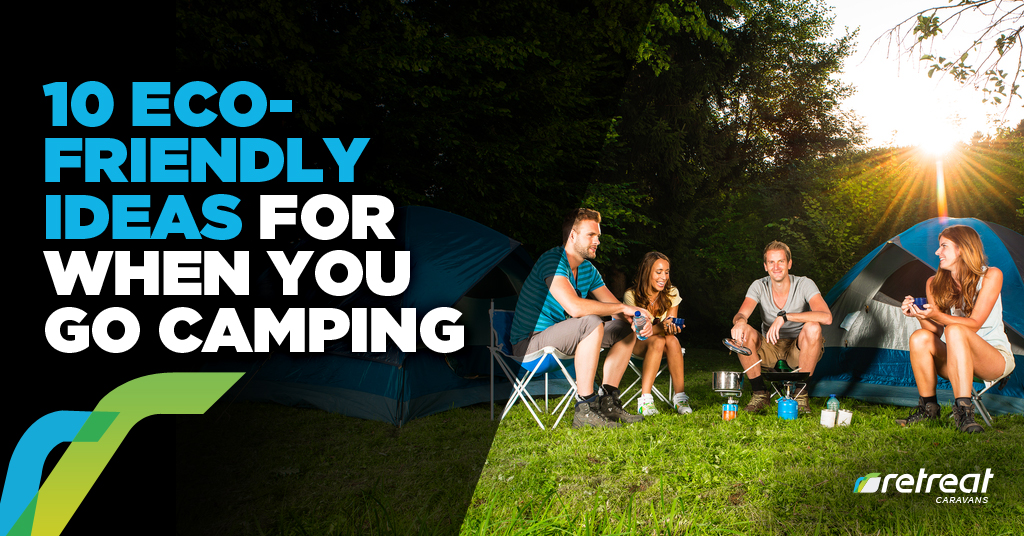
10 Eco-friendly Ideas For When You Go Camping
In a world that is becoming increasingly more aware of the environment around us, it is important that we all do our part in promoting eco-friendly alternatives for traditional lifestyles. And camping is absolutely no exception to this.
While many people assume that camping in itself is eco-friendly, this is not always necessarily the case. However, there are ways by which eco-friendly practices can be introduced and integrated into conventional camping as we know it.
If you would like to learn more about how you can make your camping trip more eco-friendly, please continue reading to learn more.
1). Buy Organic Food
Compared to traditional agriculture, organic agriculture is much easier on the environment. This is because traditional agriculture often uses synthetic fertilisers, pesticides, and herbicides that can damage the environment.
As such, purchasing organic food for your camping trip alone can be a substantial eco-friendly camping practice. This is because you are giving the environment a break from harmful chemicals associated with traditional agriculture while you’re out there enjoying the best nature has to offer.
2). DIY Snacks And Meals
By making your own snacks and meals, you can avoid single-use goods (particularly plastics), greatly minimising the waste you produce on your trip. Instead of getting individually packed snacks, you can use recycled jars and load them up with your favourite snacks, or you can choose to make your own food rather than purchase pre-made.
Additionally, making your own snacks and meals allows you to be truly aware of what is in your food. This is because, more often than not, buying protein bars for example contain preservatives and hidden sugars and are not as healthy as they are promoted to be. Therefore, DIY snacks and meals allow you to be both eco-friendly and health-conscious as well.
3). Take Care Of Your Waste
Sorting out your waste is critical. It is encouraged to bring two reusable trash bags, one for recycling and one for trash. You may even bring an extra bag for compost if you are running a compost heap at home.
If the campsite you are staying at does not have recycling bins, be sure to take recyclable items home and dispose of them properly. Make sure you do not leave any waste behind at the campsite. Not only is it bad for the environment and an eye sore, it can also attract unwanted animals and pests.
4). Use Natural Body Products
When camping it is very likely that you will be bringing sunscreen, insect repellent, lotions, or even make up. However, how you use these products can actually affect the environment.
Water-soluble products like sunscreen can pollute lakes, rivers, and other water bodies that you might encounter in your camping trip. Products that contain permethrin, which is commonly found in insect repellents, can be deadly to creatures in the water. As such, make sure to use products that are not water-soluble.
It is also recommended to make use of biodegradable toothpaste and soap. Non-biodegradable toothpaste and soap can take a long time to break down, so it is important to consider the eco-friendly alternative.
5). Use Reusable Dishes And Cutlery
Single-use items such as plates and cutlery are prone to becoming waste which remains harmful to the environment and the wildlife in it. Using reusable dishes is not only eco-friendly but cost-effective in the long run since you won’t be spending more money on buying single-use dishes and cutlery.
6). Turn To Reusable Water Bottles
Buying disposable plastic water bottles may seem convenient, but this is not a sustainable option for the environment. You should try to bring your own reusable water bottles to minimise waste and harm to the environment. You can use a bottle for easy-to-hike use and use a water-storage bag or water tank for storing larger quantities.
7). Bring Rechargeable Batteries
You can consider using rechargeable or even solar batteries to avoid unnecessary waste. Make sure to bring an extra set of batteries in case of emergency.
8). Learn Fire Safety
Learning and practising fire safety is critical if you want to avoid hazards not only for you but for the environment and other campers as well. This is especially important if you plan to start a campfire on your trip.
If a campfire isn’t set up correctly, this can lead to some serious problems. Therefore, you should consider researching fire bans, wind direction, building a fire in a fire pit, building the fire away from flammable objects, keeping the fire to a manageable size, not burning food, and not immediately leaving the site after putting the fire out.
In summary, make sure you conduct a lot of research when it comes to creating fires on a camping trip, especially if you aren’t experienced in building fires in the open.
9). Camp In Designated Areas Only
Off-road camping may seem fun, but you could be unintentionally causing environmental harm. Designated camping spots are specifically chosen based on durability and their safety for you and the environment. Therefore, you should stay in the areas that will have the least impact on the land.
10). Use, Rent, Or Repair
Products that create the lowest impact are, more often than not, those that already exist. Before you buy new camping gear, considering renting or repairing gear instead. There are also plenty of places where you can purchase second-hand camping gear. This is both an eco-friendly and cost-effective camping practice that you should consider.
Final Thoughts
There are a few practices when it comes to traditional camping that is actually not safe for the environment. As such, it is important that you reevaluate your camping trip and figure out how to make it more eco-friendly. With these 10 ideas, hopefully, it will be much easier to go on a more eco-friendly and enjoyable camping trip.
With summer upon us, now is the best time to start planning your next big adventure and what better way to enjoy the great outdoors than with a Retreat Caravan.
If you are looking for the best caravans in Australia, you can’t go past Retreat Caravans. Please check out our full range of caravans below, all carefully designed with you in mind:







